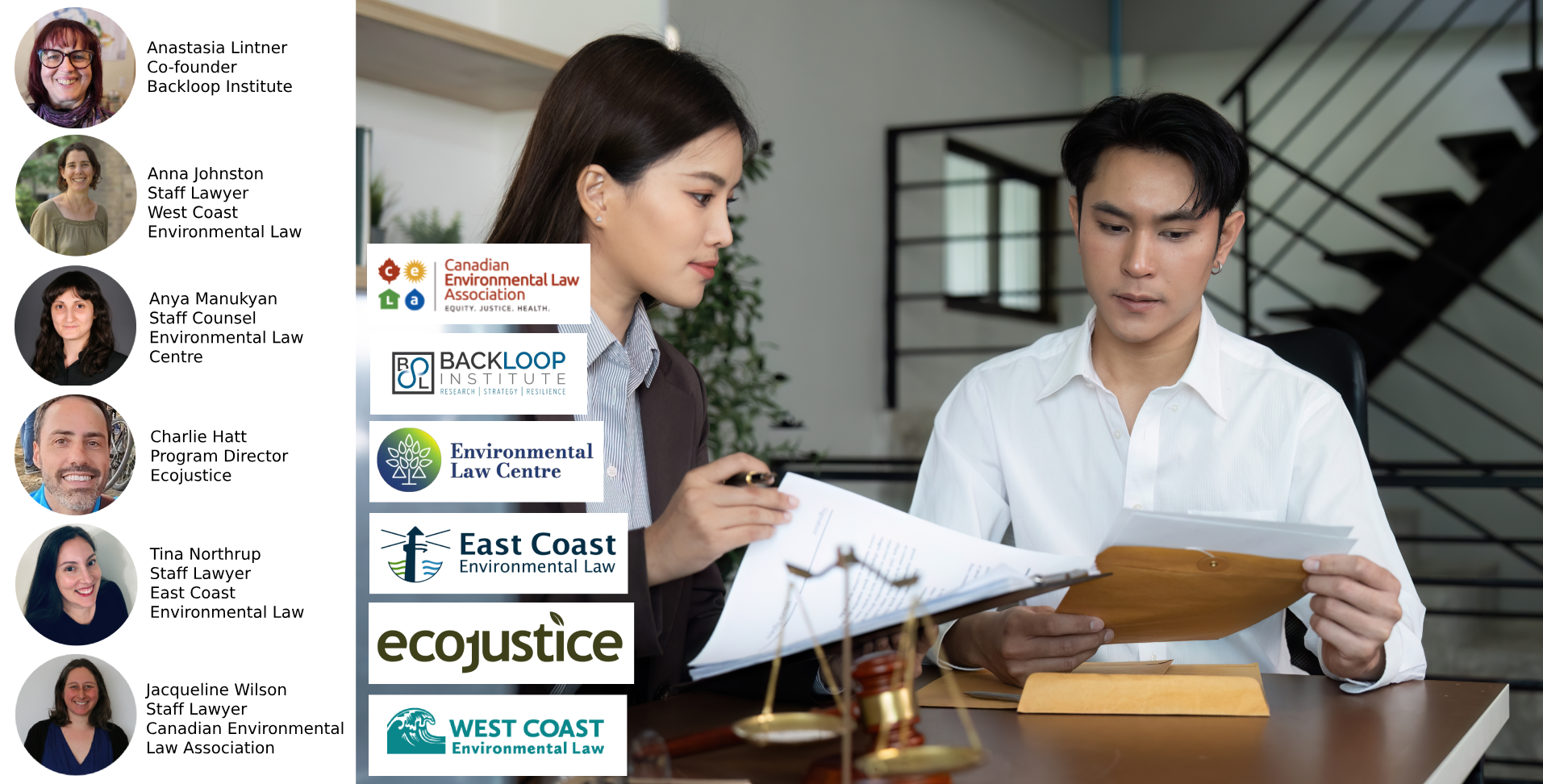
Date: Part 1 - November 5, 1-2 PM ET, Part 2 - November 19, 1-3 PM ET
Cost:
Part 1 - $20
Part 2 - $40
Part 1 & 2 Package: $50
*All registrants will be provided with a link to the recording and presentation slides following the session. The recording will be available for 60 days.
.webp)


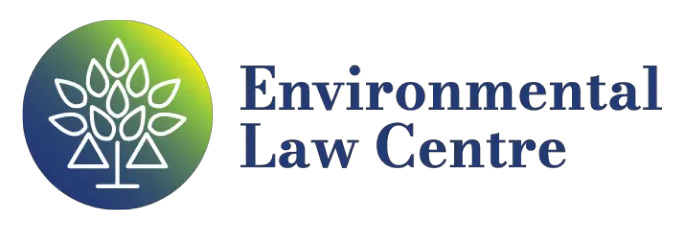


Part 1: Overview Webinar: Environmental Justice Implications of the Building Canada Act (Bill C-5)
Cost: $20 (Zoom Webinar)
In June 2025, Bill C-5 received royal assent and the Building Canada Act was enacted. In this 1-hour webinar, a panel of environmental lawyers from across Canada will provide an overview of the Building Canada Act, primary concerns related to its implementation, and opportunities for public engagement.This webinar is designed for staff or volunteers with environmental NGOs, or anyone seeking to understand the new Building Canada Act and associated projects of national interest.

Moderator:
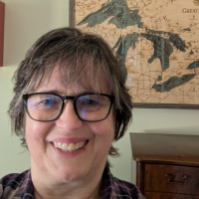
Anastasia Lintner is Co-founder and COO of Backloop Institute. She is a passionate public policy advocate, who received a PhD in natural resource and environmental economics from University of Guelph and an LLB from Osgoode Hall Law School. Anastasia is currently a non-practicing lawyer, with over two decades of extensive policy research and writing experience, including with respect to environmental assessment, conservation and water law, and Ontario's Environmental Bill of Rights. The highlight of her former legal career was the opportunity to combine economic and legal arguments for the Supreme Court of Canada in two cases: one involving the valuation of sensitive environmental lands and the other involving the intersection of insolvency protection and environmental clean-up obligations.
Panelists:
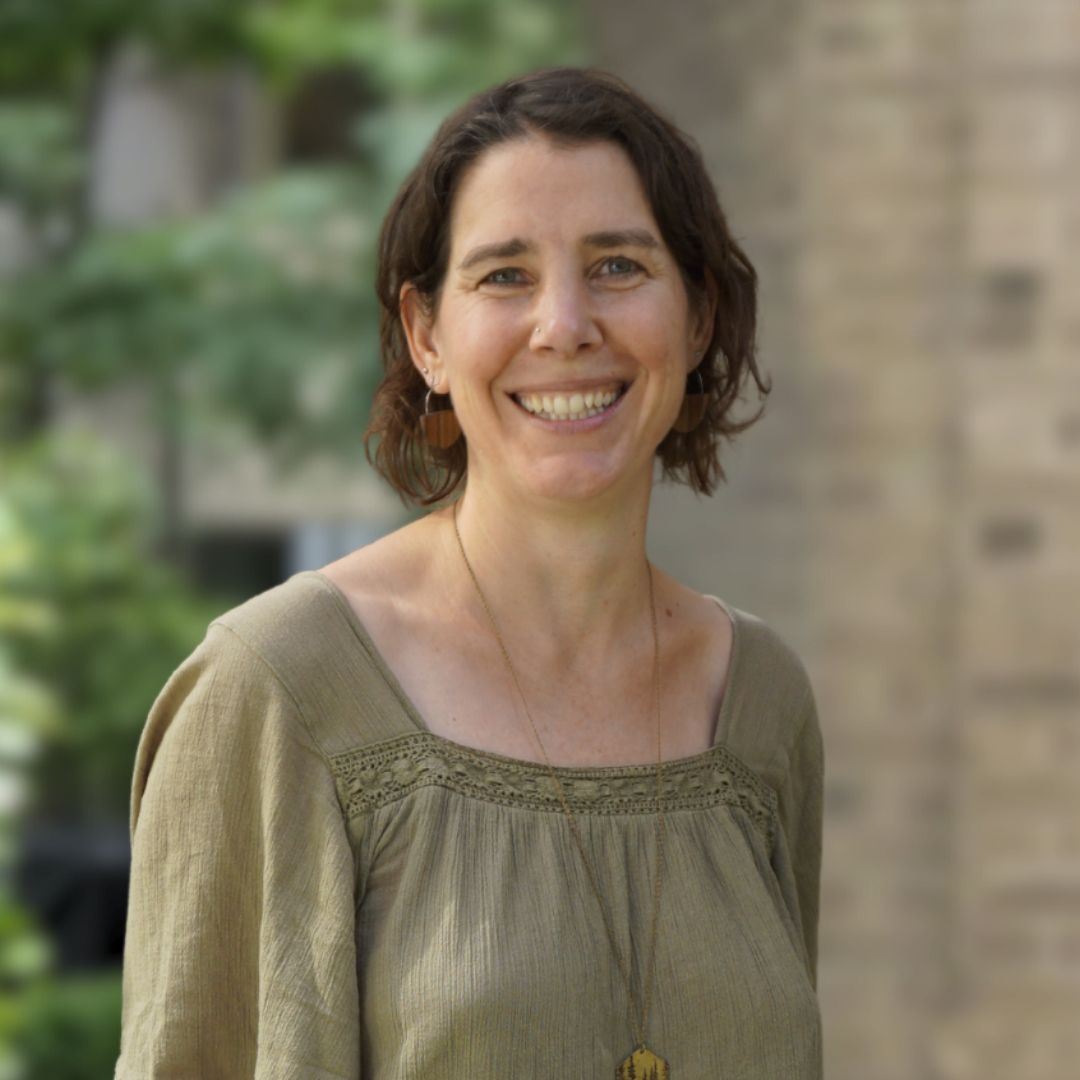
Anna Johnston BA, LLM (she/her/hers) is a Staff Lawyer at West Coast Environmental Law where she works on environmental impact assessment, cumulative effects, constitutional, biodiversity and climate law. Anna has represented community and Indigenous groups on environmental assessments of major energy projects in British Columbia and Alberta and has provided environmental legal education and support to communities across Canada. She currently co-chairs the national Environmental Planning and Assessment Caucus of the Canadian Environmental Network and sits on the Minister of Environment and Climate Change Canada’s Advisory Council on Impact Assessment.

Anya Manukyan is Staff Counsel at Environmental Law Centre in Edmonton, Alberta. She has contributed to ELC’s work on topics including energy, species at risk, grasslands, waste, and access to environmental information, as well as providing information in response to inquiries from the public. Anya is currently an associate lecturer with the University of Alberta Department of Resource Economics and Environmental Sociology and is Co-Chair of the CBA Alberta Environmental Law South section. Prior to her role at ELC, Anya briefly practiced environmental regulatory law after completing her articles with Ecojustice in 2023.

Charlie Hatt, Program Director – Climate, first joined Ecojustice as an articling student in 2012 and worked as a staff lawyer until 2019. He represented clients in litigation across a range of issues, from local drinking water, to pesticides, to pipelines, to constitutional rights in the context of climate change. Prior to rejoining Ecojustice as Climate Program Director in 2025, he practiced privately at a leading plaintiff-side class actions firm and worked in policy for the City of Toronto, leading climate governance work. As Climate Program Director, Charlie leads a team of professionals who bring strategic litigation to hold governments and corporations accountable for the science-based action needed to solve the climate crisis.

Tina Northrup is a Staff Lawyer at East Coast Environmental Law, which is a regional charity that provides public-interest environmental law services throughout Atlantic Canada. She graduated from the Schulich School of Law at Dalhousie University in 2019 and was called to the Bar in Nova Scotia in 2020. Her practice covers a wide range of environmental law issues, and her areas of special interest include: Aboriginal law and Indigenous law in environmental contexts; laws related to climate change mitigation, especially energy law focused on the renewable energy transition; environmental assessment and decision-making; human rights in environmental contexts; and, rights of nature.

Part 2: Online Workshop: Environmental Justice Implications of the Building Canada Act (Bill C-5)
Date: November 19, 1-3 PM ET
Cost: $40 (Zoom Meeting)
50 participant max
In June 2025, Bill C-5 received royal assent and the Building Canada Act was enacted. In this 2-hour workshop, presenters will interactively involve participants in discussing strategic legal considerations for campaigns aimed at implementation of the Building Canada Act. There will also be regionally relevant discussions, including BC’s Bill 15 (Infrastructure Projects Act) and Ontario's Bill 5 (Protect Ontario by Unleashing our Economy Act, 2025).
This workshop is designed for staff or volunteers with environmental NGOs who are working on Bill C-5 implementation, or anyone seeking to become engaged regarding the new Building Canada Act and associated projects of national interest.

Presenters:

Anastasia Lintner is Co-founder and COO of Backloop Institute. She is a passionate public policy advocate, who received a PhD in natural resource and environmental economics from University of Guelph and an LLB from Osgoode Hall Law School. Anastasia is currently a non-practicing lawyer, with over two decades of extensive policy research and writing experience, including with respect to environmental assessment, conservation and water law, and Ontario's Environmental Bill of Rights. The highlight of her former legal career was the opportunity to combine economic and legal arguments for the Supreme Court of Canada in two cases: one involving the valuation of sensitive environmental lands and the other involving the intersection of insolvency protection and environmental clean-up obligations.
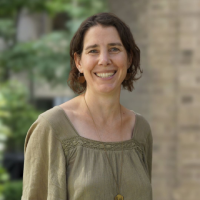
Anna Johnston BA, LLM (she/her/hers) is a Staff Lawyer at West Coast Environmental Law where she works on environmental impact assessment, cumulative effects, constitutional, biodiversity and climate law. Anna has represented community and Indigenous groups on environmental assessments of major energy projects in British Columbia and Alberta and has provided environmental legal education and support to communities across Canada. She currently co-chairs the national Environmental Planning and Assessment Caucus of the Canadian Environmental Network and sits on the Minister of Environment and Climate Change Canada’s Advisory Council on Impact Assessment.

Jacqueline Wilson, BA, JD, is a staff lawyer at Canadian Environmental Law Association (CELA) and coordinates the student program. Jacqueline joined CELA in 2015 and represents individuals, public interest community groups, and First Nations before tribunals and in trial and appellate courts. Her case work focuses on environmental justice relating to air, land and water pollution, and climate adaptation. Jacqueline’s law reform work focuses on climate adaptation, energy justice, lead in drinking water and land use planning.

Session 1: Settler Colonialism 101
Introduce ENGO representatives to the fact that colonization is a structure and not an event. Identifies key ways that colonialism moves through individuals and organizations.
Session 2: Positionality
ENGO representatives learn how to articulate their social location within a settler colonial state, and in relation to potential Indigenous partners.
Session 3: Inherent Indigenous Governance 101
Introduce the fact that Indigenous nations have their own sources of political authority that they can (and do) draw on when addressing environmental issues. Examples provided.
Session 4: Building Better Relations
ENGO representatives will road test ways they can implement previous workshop key points to re-imagine partnerships with Indigenous nations.
Cost: $100 (or register 4 staff from the same organization for one stream and get the 5th registration free)
All registrants will be provided with a link to access the recordings and presentation slides for 60 days following each session.

Session 1: Diagnosing Settler Colonialism in the Enviro Sector
Participants will be asked to share ways in which they have diagnosed and traced power in social justice movements and/or in the ENGO sector. This workshop will make space for discomfort as part of promoting decolonization.
Session 2: Inherent Indigenous Governance
A mix of advanced and introductory theory, this workshop delves into legal and political pluralism, naming the fact that Indigenous nations have their own sources of political authority that they can (and do) draw on when addressing environmental issues.
Session 3: The Nonprofit Industrial Complex
ENGO participants are introduced to theories and examples describing the Nonprofit Industrial Complex and the “Shadow State.” Purpose is to show how settler colonialism structures civil society.
Session 4: Decolonizing ENGO-First Nation Partnerships
This workshop delves deep into how ENGOs can partner with Indigenous nations beyond the Nonprofit Industrial Complex while promoting deference to inherent Indigenous political leaders.
Cost: $100 (or register 4 staff from the same organization for one stream and get the 5th registration free)
All registrants will be provided with a link to access the recordings and presentation slides for 60 days following each session.

The Indigenous only space will be collaborative in nature but critical in approach. This track is a space for Indigenous folks within the ENGO sector to come together to discuss their experiences and work, with an eye to taking a position on what the sector might need to do in order to promote decolonization. Participants will use the first session to define our goals for the remaining three meetings. Therefore, session topics named here are proposals only.
Session 1: Naming the Cannibal: Settler Colonialism in the ENGO Sector
Session 2: Proposed topic: Reflections on working in the ENGO Sector
Session 3: Proposed topic: Centering Indigenous Thought in the ENGO Sector
Session 4: Proposed topic: Visioning a Decolonial Environmental Sector
Cost: Free
